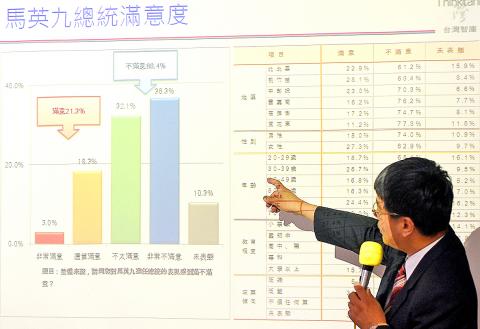On the eve of the final year of President Ma Ying-jeou’s (馬英九) second four-year term today, Ma’s disapproval rating stood at nearly 70 percent or higher in various surveys, while his approval rating was as low as less than 20 percent.
About 68.4 percent of respondents were dissatisfied with Ma’s performance as president, against 21.3 percent who said they were satisfied, in a telephone-based poll conducted on Sunday, Taiwan Thinktank said yesterday.
A cross-analysis of differences in political party affiliation found that among respondents who identified themselves as supporters of the pan-blue camp, 50.5 percent said they found Ma’s governance dissatisfactory, the poll showed.

Photo: Chen Chih-chu, Taipei Times
The survey found 49.1 percent of respondents doubted the image Ma has sought to establish as a clean politician because they said they believed there might have been some irregularities involving Ma in his handling of the Taipei Dome project when he was Taipei mayor, while 29.2 percent believed he was clean.
The president has repeatedly stressed that only by respecting the so-called “1992 consensus” — an alleged agreement between the Chinese Nationalist Party (KMT) and the Chinese Communist Party that there is “one China, with each side having its own interpretation of what ‘one China’” means” — can the “status quo” be maintained, but the survey found that a majority of people did not agree.
According to the survey, 68.7 percent of the public said they support maintaining the “status quo,” while only 15.4 percent said they support the “1992 consensus.”
KMT Chairman and New Taipei City Mayor Eric Chu’s (朱立倫) description of cross-strait relations as “both sides belonging to one China,” to which Ma has given his endorsement, was supported by only 13 percent of respondents, while 77.4 percent said Taiwan and China are both sovereign states, independent of each other and not subordinate to the other, the survey found.
About 50.2 percent of respondents said the government should place more consideration on the impact of cross-strait exchanges and negotiations on national security, while 38.1 percent said economic benefits should be the main concern, the poll showed.
On a scale of zero to 10, with zero indicating “not at all” and 10 signifying “extremely,” the extent to which respondents perceived Taiwan as depending on China to maintain its economic growth stood at 6.1. Moreover, 62.2 percent of respondents said Taiwan should deepen its economic ties with countries other than China.
A survey that the Chinese-language Liberty Times (the sister paper of the Taipei Times) conducted from Saturday to Monday found that 14.52 percent of respondents said they were satisfied with Ma’s performance over the past seven years, against 64.3 percent who thought the opposite.
Similar results were found in a survey released by the TVBS poll center yesterday showing Ma’s approval rating at 16 percent and disapproval rating at 67 percent.
In another poll, conducted by Taiwan Indicators Survey Research, 15.4 percent expressed satisfaction with Ma, while 75.7 percent were dissatisfied.
Additional reporting by Shih Hsiu-chuan

CHAOS: Iranians took to the streets playing celebratory music after reports of Khamenei’s death on Saturday, while mourners also gathered in Tehran yesterday Iranian Supreme Leader Ayatollah Ali Khamenei was killed in a major attack on Iran launched by Israel and the US, throwing the future of the Islamic republic into doubt and raising the risk of regional instability. Iranian state television and the state-run IRNA news agency announced the 86-year-old’s death early yesterday. US President Donald Trump said it gave Iranians their “greatest chance” to “take back” their country. The announcements came after a joint US and Israeli aerial bombardment that targeted Iranian military and governmental sites. Trump said the “heavy and pinpoint bombing” would continue through the week or as long

TRUST: The KMT said it respected the US’ timing and considerations, and hoped it would continue to honor its commitments to helping Taiwan bolster its defenses and deterrence US President Donald Trump is delaying a multibillion-dollar arms sale to Taiwan to ensure his visit to Beijing is successful, a New York Times report said. The weapons sales package has stalled in the US Department of State, the report said, citing US officials it did not identify. The White House has told agencies not to push forward ahead of Trump’s meeting with Chinese President Xi Jinping (習近平), it said. The two last month held a phone call to discuss trade and geopolitical flashpoints ahead of the summit. Xi raised the Taiwan issue and urged the US to handle arms sales to

BIG SPENDERS: Foreign investors bought the most Taiwan equities since 2005, signaling confidence that an AI boom would continue to benefit chipmakers Taiwan Semiconductor Manufacturing Co’s (TSMC, 台積電) market capitalization swelled to US$2 trillion for the first time following a 4.25 percent rally in its American depositary receipts (ADR) overnight, putting the world’s biggest contract chipmaker sixth on the list of the world’s biggest companies by market capitalization, just behind Amazon.com Inc. The site CompaniesMarketcap.com ranked TSMC ahead of Saudi Aramco and Meta Platforms Inc. The Taiwanese company’s ADRs on Tuesday surged to US$385.75 on the New York Stock Exchange, as strong demand for artificial intelligence (AI) applications led to chip supply constraints and boost revenue growth to record-breaking levels. Each TSMC ADR represents

State-run CPC Corp, Taiwan (CPC, 台灣中油) yesterday said that it had confirmed on Saturday night with its liquefied natural gas (LNG) and crude oil suppliers that shipments are proceeding as scheduled and that domestic supplies remain unaffected. The CPC yesterday announced the gasoline and diesel prices will rise by NT$0.2 and NT$0.4 per liter, respectively, starting Monday, citing Middle East tensions and blizzards in the eastern United States. CPC also iterated it has been reducing the proportion of crude oil imports from the Middle East and diversifying its supply sources in the past few years in response to geopolitical risks, expanding